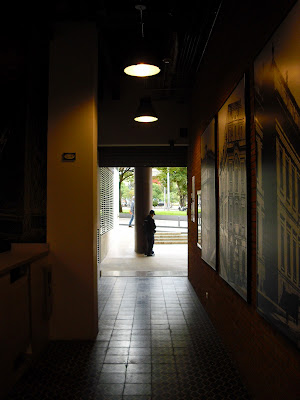As mentioned in our previous post, you can never drop your guard in Colombia. It’s up to you, naturally enough really, to be responsible for yourself and your belongings.
Be that as it may, it still doesn’t, or at least shouldn’t, make it more acceptable if you do happen to have something stolen while having ‘a moment of weakness’.
 |
| Scene of the crime: Oma may be upmarket, but that doesn't mean it's safer. |
Que pena
That such things happen, as they do across the globe, doesn’t mean that we should just shrug and accept them. Disappointingly, this is often the reaction of many people in these parts.
It’s the whole ‘dar papaya’ mentality, that it’s the victims' fault for allowing themselves to be robbed. ‘Silly you.’ This is linked in with the ‘que pena con usted’ expression, ‘isn’t that awful for you, but I don’t really care.’ ‘Eh, thanks, guys.’
Personally, having been based in Bogotá for three years now, I feel relatively comfortable in my environs and I am usually clued in to any potential threats.
It’s the whole ‘dar papaya’ mentality, that it’s the victims' fault for allowing themselves to be robbed. ‘Silly you.’ This is linked in with the ‘que pena con usted’ expression, ‘isn’t that awful for you, but I don’t really care.’ ‘Eh, thanks, guys.’
Personally, having been based in Bogotá for three years now, I feel relatively comfortable in my environs and I am usually clued in to any potential threats.
Yet, there is always the risk that you can become too relaxed. My excuse for the latest incident where I let the city’s ladrones (thieves) get one over me was that I’d just donated blood (for the first time in my life it must be said) and perhaps I wasn’t my usual shrewd self (don’t laugh).
Now, this time around the scene wasn’t your typical Wrong Way working-class venue, but rather a much more upmarket Oma café (the newly opened one in Torre Bicentenario on Carrera 4 with Avenida Jiménez), equipped with a security guard and cameras.
However, therein lies the danger; the feeling that you and your possessions are a little safer in such a place.
Now, this time around the scene wasn’t your typical Wrong Way working-class venue, but rather a much more upmarket Oma café (the newly opened one in Torre Bicentenario on Carrera 4 with Avenida Jiménez), equipped with a security guard and cameras.
However, therein lies the danger; the feeling that you and your possessions are a little safer in such a place.
In fact, it could be argued that the sheer volume of security guards employed in this country dilutes each individual one’s impact. I certainly wouldn’t be relying on many of them to have my back in a tight corner.
The "fatal" errors on my part were not having my bag in eyeshot or tied around something secure and not taking notice of the movements around me; the intense conversation I was having with an old friend was occupying my mind.
Whatever the case, the relatively well-dressed ladrones saw their opportunity and seized it.
Thankfully, it was far from spectacular the booty they got. Basically, there was the bag itself, a few USB sticks, an old jacket (of sentimental value albeit) and a pocket-book of Spanish grammar along with an English-Spanish dictionary – at least those latter items might help our pilferers overcome their illiteracy problems.
Predictably, when we reported the robbery to the building’s administrator, her initial reaction fell firmly into the ‘dar papaya’ mindset.
The "fatal" errors on my part were not having my bag in eyeshot or tied around something secure and not taking notice of the movements around me; the intense conversation I was having with an old friend was occupying my mind.
Whatever the case, the relatively well-dressed ladrones saw their opportunity and seized it.
 |
| 'On the ball' security. Well, not quite ... |
Predictably, when we reported the robbery to the building’s administrator, her initial reaction fell firmly into the ‘dar papaya’ mindset.
To her credit, though, she eventually showed some morsels of taking affirmative action, agreeing to set in train the process of reviewing the premise’s security cameras.* Perhaps next time she'll realise that this should be her first response.
You see, as official Colombia grapples with a potential peace agreement with the Farc guerrillas, real peace and security must come from the people, ‘el pueblo Colombiano’, each and every part of it. Taking a strong stand against all who jeopardise this is what’s needed.
There are positive signs in this regard, but by its very nature, it’s a never-ending process, consisting of many different, overlapping strands. This country, however, has too many decent people to let a thuggish minority dominate the landscape.
Yet, turn a blind eye to that minority’s behaviour and the vicious cycle will continue.
____________________________________
*That process is still ongoing. Hopefully, if and when the cameras are reviewed, we’ll have a good picture of the thieves, something that we can publish.
You see, as official Colombia grapples with a potential peace agreement with the Farc guerrillas, real peace and security must come from the people, ‘el pueblo Colombiano’, each and every part of it. Taking a strong stand against all who jeopardise this is what’s needed.
There are positive signs in this regard, but by its very nature, it’s a never-ending process, consisting of many different, overlapping strands. This country, however, has too many decent people to let a thuggish minority dominate the landscape.
Yet, turn a blind eye to that minority’s behaviour and the vicious cycle will continue.
____________________________________
*That process is still ongoing. Hopefully, if and when the cameras are reviewed, we’ll have a good picture of the thieves, something that we can publish.

